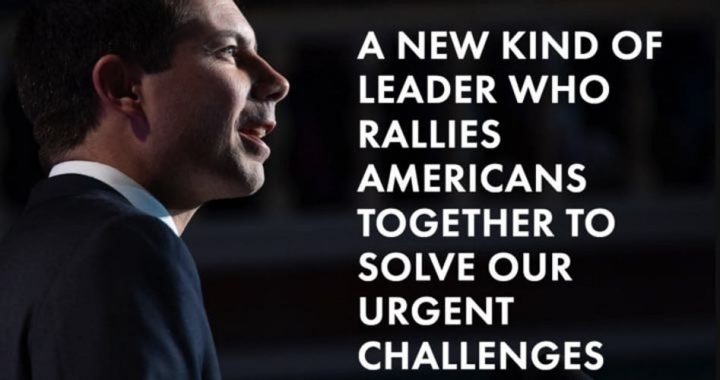
The continued rise of Pete Buttigieg (shown), the mayor of South Bend, Indiana, in the race for the Democratic nomination for president, is shaking up that party’s contest. With his moving into contention as the front-runner, look for his record and background to come under increased scrutiny — starting Wednesday night during the Democratic presidential debate in Atlanta, Georgia.
Buttigieg finished first, by a strong margin, over his Democratic rivals in the latest Saint Anselm College Survey Center poll of 255 likely Democratic primary voters in New Hampshire, the nation’s first-in-the nation presidential primary. Combined with Buttigieg’s first-place standing in a weekend poll in Iowa, the nation’s first caucus state, it appears that Democratic Party primary voters are not coalescing behind any of the three candidates — former Vice President Joe Biden, Senator Elizabeth Warren, and Senator Bernie Sanders — who have constituted the “top tier” in the race for the past few months.
While Buttigieg’s unexpected lead in Iowa could be chalked up to his closer proximity to that state, his surge ahead of Biden, Warren, and Sanders is significant. Warren and Sanders represent states neighboring New Hampshire (Massachusetts and Vermont, respectively) and Biden, who hails from Delaware, a state much closer to the Granite State than Indiana.
Buttigieg had 25-percent support in the Saint Anselm poll, a lead of 10 percentage points over both Biden and Warren, who are presently tied at 15 percent. Sanders is trailing further back, with nine percent. Other candidates and their percentages include Senator Amy Klobuchar of Minnesota, at six percent; Tom Steyer of California at five percent; U.S. Representative Tulsi Gabbard of Hawaii and Senator Cory Booker of New Jersey both at three percent; Andrew Yang of New York with two percent; and finally, Senator Kamala Harris of California, who has collapsed all the way to one percent.
White working-class voters were largely abandoned by the Democratic Party in Hillary Clinton’s ill-fated campaign of 2016, causing her to lose Wisconsin, Michigan, and Pennsylvania. Now, the surge of Buttigieg, along with the anemic showings of African American candidates Booker and Harris, indicates that that voting bloc is now considered of lesser-importance, as well.
Former first lady Michelle Obama, who has been mentioned as a prospective presidential candidate, does not seem to be garnering much encouragement to enter the race, as 55 percent of those surveyed in the poll said they would be opposed to her becoming a candidate.
As a voting bloc, black voters are expressing little support for Buttigieg, Warren, or Sanders. Part of that could be that African Americans are being taken for granted. The issues that much of the Democratic presidential field are embracing are not resonating any more with black voters than the white working-class voters — issues such as open borders, more environmental regulations, and the emphasis of deviant sexual behavior.
Black voters regularly poll less support for LGBT issues than white voters. Buttigieg is openly homosexual, with a “husband,” whom he has kissed in public. While that may excite higher-income white liberals, it is not likely to generate much support among white working-class voters or African Americans either.
Buttigieg’s sexual orientation may become a larger problem in a general election contest, especially since he regularly pushes the narrative that homosexual relationships are not only perfectly normal, but are biblically supported. While some Christians may be willing to overlook Buttigieg’s personal sexual practices, many will likely resent being told that their own interpretations of Scripture are bigoted and incorrect.
In addition to the good news for Buttigieg, the Anselm Poll indicated that Democrats in New Hampshire are not willing to give former Secretary of State Hillary Clinton a second chance to take on President Donald Trump. An astounding 91 percent told pollsters that they would discourage her from running in 2020.
Also troubling for Democrats is that when all voters were asked who they believe would have the best chance of winning against Trump, respondents indicated that they did not believe any of the Democrats were likely to win in November 2020. The best showing in this category was scored by Biden, who finished 12 points behind Trump (52-40). Only 27 percent thought Sanders could defeat Trump, and only 26 percent expressed the belief that Warren could win over the incumbent president.
Despite his rise in the polls among Democrats, Buttigieg did no better, with respondents, by a margin of 63-26, predicting Trump would win against him.
When one considers that Buttigieg is a 37-year-old mayor of a relatively small city of only about 100,000 people, that should not be surprising. In ordinary times, the candidacy of a mayor of a mere 100,000 people who kisses his “husband” in public and declares homosexuality to be perfectly Christian would be a joke.
While events could alter the political landscape before November of next year, as it now stands, President Trump appears headed to reelection.
Image of Pete Buttigieg: peteforamerica.com
Steve Byas is a university instructor and author of History’s Greatest Libels. He may be contacted at [email protected]



